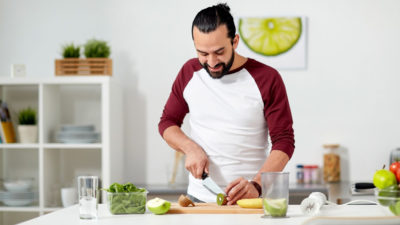Snacks

We often have go-to meals and know what makes them great for us but when it comes to snacks, we sometimes struggle. Either we always have the same stuff or we forget to prepare anything and end up grabbing something on the go. Snacking is important for your athletic game so it pays to do it well.
The key to performance-enhancing snacking is to get the right kind of energy at the right time. If you eat a big meal before training, it’ll make you feel uncomfortable or even sick during your exercise, you won’t digest the food well and it’ll make you feel tired. On the other hand, if you feel weak because you haven’t eaten for hours, it’s not ideal to go ahead and burn a lot more energy.
Your muscles have their own store of energy – glycogen. This storage form of glucose will fuel any kind of exercise for about 90 minutes before you start ‘hitting the wall’. That means you don’t necessarily need a snack before training but if you’ve been running around, stressed or perhaps didn’t have enough sleep, it’s a good idea to have something to give you a boost.
Whether you’re preparing for a run, a game of football or a gym session, you need something light. It should be mainly carbohydrates, possibly some protein, but very little fat. Fat takes longer to digest so it’s not your pre-workout friend. Good carbs will give you a lasting energy boost, which is exactly what’s needed. Here are a few ideas:
- Smoothie – easy to digest and full of healthy energy; freshly made is always best
- Piece of fruit – banana, orange, apple, pear, peach, mixed fruit bowl – choose your favourite
- Energy bar – made from dried fruit and nuts or oats, avoid fatty oat bars (flapjacks)
- Oat biscuit and a few dried apricots (or other dried fruit)
- Small serving of muesli with low-fat plant yoghurt
- A few dates – as they are or you can simply blend them with water for a sweet energy drink (requires a high-speed blender for a non-chunky experience!)
- A glass of beetroot juice – beetroot juice increases the level of nitric oxide in your blood which helps to dilate your blood vessels, improving blood flow to the muscles. It means your muscles work more efficiently and their contraction is stronger. However, if your diet already contains plenty of vegetables, which also increase your nitric oxide levels, drinking beetroot juice won’t offer much more of an advantage.
- Caffeine – not a must by any means but if you need a boost, having a coffee or tea 15-60 minutes before your workout can improve your stamina
If your workout or training lasts around 60 minutes, all you need is water to stay hydrated. If training continues for longer and is making you sweat, have an isotonic drink – a drink that contains some sugars to keep your energy levels up and mineral salts to replenish minerals lost through sweating. You can make your own by combining 300 ml water with 200 ml fresh/cold-pressed fruit juice, and a small pinch of salt. For extra energy, you can add a teaspoon of brown sugar.
If you’re an endurance athlete, you’ll need some extra carbs to provide energy during long training – 30-60 grams of carbs per hour.
That can be one of the following:
- A banana
- A small bunch of grapes
- Mashed sweet potato with raisins and cinnamon
- A small handful of raisins or dates – on their own or blended with water to make an energy drink
- Plant-based energy bar
- Rice or corn cakes covered with dark chocolate
- Diluted fruit smoothie
Your muscle glycogen stores get used up during training and your muscles suffer microscopic tears. That’s why it’s important to nourish your body after a workout – to help it recover in the best possible way. You need protein for muscle repair and some healthy carbohydrates to replenish glycogen.
For optimal muscle repair and growth, it’s recommended that we consume 0.14-0.23 grams of protein per pound of body weight (0.3-0.5 g/kg) within 45 minutes of training – that would be 20-40 grams for most people (1).
To refuel your glycogen stores, you need about 0.45 grams of carbs per pound of body weight (or 1 g/kg) post-exercise. This is important mostly for people who train daily and work hard. If you train less than that, you don’t have to worry about the exact amount.
Here are some examples of post-workout snacks:
- Plant protein shake and a banana
- Oatmeal with protein powder and fruit
- Protein bar and fruit
- Wholemeal pitta bread, hummus and tomato
- Rice or corn cakes with peanut butter
- Wholegrain toast with nut butter and fruit
- A handful of nuts and dried fruit
- Baked beans on toast
We don’t always eat around exercise time so let’s look at snacks for anytime. Healthy snacks throughout the day support our overall fitness. Even when trying to lose weight, it’s best to choose the right snacks, rather than skip them. So depending on what your goal is, snack accordingly:
Gain weight the healthy way
- Wholemeal bread/bagel with nut butter and veggies or dried fruit
- Rich smoothie with nuts/seeds/nut butter and oats
- Avocado on wholemeal toast
- Trail mix – dried fruit and nuts
- Wholegrain tortilla wrap loaded with hummus and beans, or salsa and smoked tofu
- Oat snack bar – sweetened with dried fruit rather than sugar
- Protein bar and some fruit
Maintaining weight
- Plant yoghurt with fruit
- Fruit slices with nut butter
- Roasted chickpeas, beans or edamame
- Rye crispbread with hummus/bean dip and veggies
- Dried fruit and nuts
- Fresh fruit smoothie
Lose weight
- Fruit and vegetables – fresh, in a salad, or blended in a smoothie
- Rye crispbread, low-fat spread and veggies
- Vegetable soup
- Miso soup
- Unsweetened dried fruit
- Low-fat plant yoghurt
Finding what works for you may be a bit of a journey. Sometimes, the perfect snack is not out there so we have to make it ourselves. You can make your own snack bars or energy balls by combining and blending (in a food processor) dried fruit, nuts, oats and spices (cinnamon, ginger, cacao) or protein/superfood powders.
Making a smoothie for the day ahead is also an excellent habit to cultivate and so is keeping a jar of nut butter at hand and dipping veggie sticks or fruit slices in it. If you’ve had enough of hummus, make a different spread/dip – blend beans/chickpeas/tofu with a little oil, salt, spices and anything else you like (eg peppers or olives). Not only are these snacks to your taste, they are cheaper than shop-bought!
Many of us don’t manage to eat enough during the day or simply feel like eating more at night. You shouldn’t eat a full-blown meal right before bed but a snack or protein shake an hour before sleep is ok. It’s certainly better than waking up after midnight and raiding the fridge!
You don’t have to be perfect all the time – biscuits and ice cream can be a nice treat and you can always make them healthier. Get wholemeal or oat biscuits and instead of scoffing half a pack in one sitting, have just a few and eat them with some dark chocolate and a piece of fruit. Or spread some peanut butter on top!
If crisps are your weakness, try chickpea ones or poppadums – they have more protein and less fat than potato crisps. Even better, combine them with olives and tomato salsa and you have a healthy evening snack!
Fine-tuning your snacking can make a world of difference to your health, energy levels and athletic endeavours. Be prepared and always have some healthy snacks with you so you’re not caught hungry.
See Sample Meal Plans for menu planning according to your level of activity.







